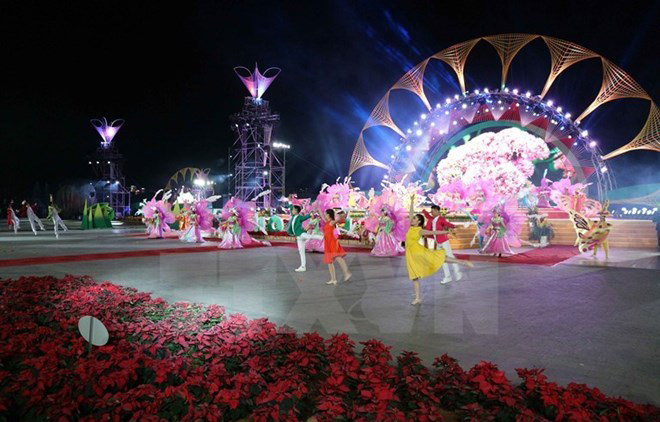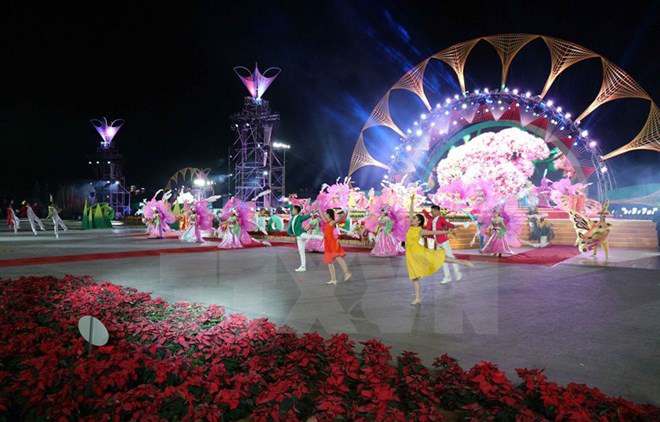
More than 700 litres of free wine were served at the 7th Da Lat Flower Festival in the Central Highlands province of Lam Dong on December 24.

An art performance at the opening ceremony of the 7th Da Lat
Flower Festival (Photo VNA)
Thousands of locals and tourists
participated in the night wine festival in the resort city of Da Lat.
The festival was divided into various sectors featuring local special dishes
and street music.
A photo exhibition highlighting the beauty of the Central Highlands and central
coastal region kicked off the same day in Da Lat city.
In another event in the framework of the 7th Da Lat Flower Festival, a fashion
show highlighting locally-made silk was held in Bao Loc city, Lam Dong
province, which is dubbed Vietnam’s silk capital, on December 24.
The silk was used in 13 collections by famous designers such as Minh Hanh, Ngoc
Han, Ha Duy, Nguyen Thuy and Nhi Hoang.
The same day 32 years ago, the Government issued a decree building Bao Loc into
Vietnam’s silk city.
The 7th Da Lat Flowers Festival is taking place at Lam Vien Square from
December 23-27 under the theme of "Da Lat Flowers - A Miracle from the Good
Earth”.
More than 5,000 art works of flowers, bonsai and plant are being displayed at
an international bonsai and flower exhibition.
A series of workshops are also scheduled within the framework of the festival
to promote investment in Lam Dong, discuss Da Lat’s development planning and
develop local tea and silk products.
Source: VNA
With an increasingly vibrant and widespread emulation movement aimed at building cultured residential areas and cultured families, Yen Thuy District has been making steady progress toward improving both the material and spiritual well-being of its people, while fostering a civilized, prosperous, beautiful, and progressive community.
Once lacking recreational spaces and community facilities, Residential Group 2 in Quynh Lam Ward (Hoa Binh City) has recently received attention for the construction of a new, spacious, and fully equipped cultural house. The project followed the model of state support combined with public contributions in both labor and funding.
The "All people unite to build cultural life" movement, which has been effectively integrated with Kim Boi district’s socio-economic development goals, is fostering a lively spirit of emulation across local residential areas, hamlets, villages, public agencies, and enterprises. In addition, through the initiative, traditional cultural values are being preserved and promoted, while community solidarity and mutual support in poverty reduction and economic development are being strengthened.
A working delegation of the Hoa Binh provincial People’s Committee led by its Permanent Vice Chairman Nguyen Van Toan on June 11 inspected the progress of a project to build the Mo Muong Cultural Heritage Conservation Space linked to tourism services in Hop Phong commune, Cao Phong district.
Born and growing in the heroic land of Muong Dong, Dinh Thi Kieu Dung, a resident in Bo town of Kim Boi district, in her childhood was nurtured by the sweet lullabies of her grandmother and mother. These melodies deeply imprinted on her soul, becoming an inseparable part of her love for her ethnic group's culture. For over 20 years, this love for her hometown has driven Dung to research, collect, and pass down the cultural values of the Muong people to future generations.
In the final days of May, the Ethnic Art Troupe of Hoa Binh Province organized performances to serve the people in remote, mountainous, and particularly disadvantaged areas within the province. These were not just ordinary artistic shows, but they were the meaningful journeys aimed at spreading cultural values, enhancing the spiritual life of the people and contributing to the preservation of ethnic minority cultural identities.



